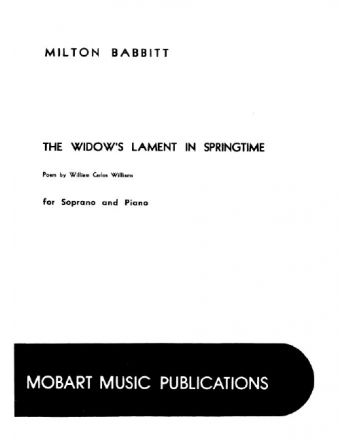
Milton Babbitt
Herkunftsland:
Vereinigte Staaten von Amerika
Geburtstag:
10. Mai 1916
Todestag:
29. Januar 2011
Über Milton Babbitt
Composer Milton Babbitt's influence on contemporary music is inestimable. His innovative use of the human voice, his infusions of electronic tape sounds into live performances, his serial compositional techniques and pioneering work in synthesized sound, all broke new ground in the music world. His compositions, with their twelve-tone structures, complex mathematical tonal combinations, and synthetic sounds, offered up with Babbitt's cerebral explanations, evince serious purpose, energy, and wit. His influence was achieved as much through his extensive writings on music as through his music itself. His relative lack of concern with audience appeal was perhaps itself one of the keys to his success, giving him the freedom to experiment. In an article titled "Who Cares If You Listen?" (1958), Babbitt described the modern-day composer of "new" music as a highly advanced specialist, an ivory-tower figure comparable to a closeted research scientist, who's first responsibility is the advancement of his or her art, and in whom the general music-loving public, quite understandably and properly, has and can have little interest. Born in Philadelphia in 1916, Babbitt studied composition with Marion Bauer and Philip James at New York University (B.A., 1935), and privately with Roger Sessions. When Sessions took a teaching position at Princeton University, Babbitt followed him there. He continued his studies--earning, in 1942, an M.F.A. in music--and himself joined the Princeton faculty in 1938. This began an enduring relationship with Princeton--including a brief stint as a teacher of mathematics during World War II--from which Babbitt finally retired as professor emeritus in 1984. While at Princeton, Babbitt served, from 1959 to 1984, as director of the Columbia-Princeton Electronic Music Center. He also taught composition at the Juilliard School of Music, beginning in 1973, and gave guest lectures at numerous institutions of higher learning in both the United States and abroad. Babbitt was honored in 1982 with a Pulitzer Prize Special Citation for his "life's work as a distinguished and seminal American composer," and in 1986 he was the recipient of a MacArthur Fellowship. He is a member of the National Institute of Arts and Letters and a Fellow of the American Academy of Arts and Sciences, which awarded him a Gold Medal in music in 1988. He served on the editorial board of Perspectives of New Music and as president of the American branch of the International Society of Contemporary Music (ISCM). In 1992 he was awarded a Ph.D. from Princeton for a paper he had written in 1946 concerning Arnold Schoenberg's compositional method. The university had deemed the work unworthy at the time of its writing. Babbitt has been the subject of many articles and books, including An Introduction to the Music of Milton Babbitt, by Andrew Washburn Mead; Milton Babbitt: Words about Music, a compilation of Babbitt's lectures, edited by Stephen Dembski and Joseph N. Straus; and The Collected Essays of Milton Babbitt, edited by Stephen Peles, Stephen Dembski, Andrew Mead, and Joseph N. Straus.Artikel
-
Song CycleAuf Lager7,95 €Inkl. MwSt., zzgl. Versandkosten
-
Auf Lager4,95 €Inkl. MwSt., zzgl. Versandkosten
-
for pianoNicht lieferbar11,95 €Inkl. MwSt., zzgl. Versandkosten


